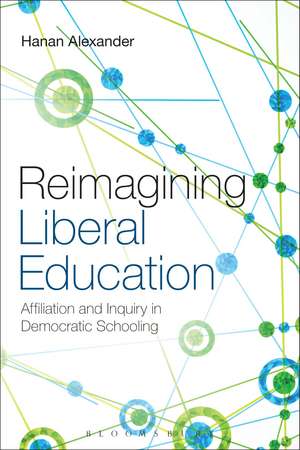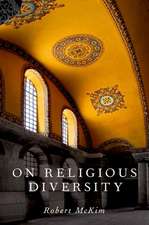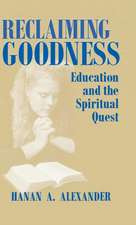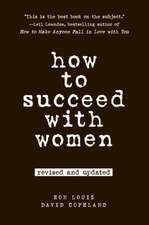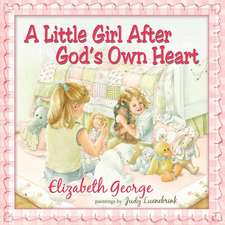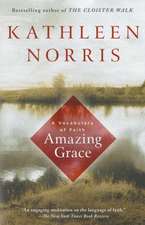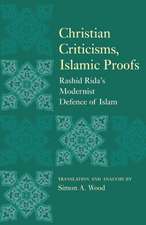Reimagining Liberal Education: Affiliation and Inquiry in Democratic Schooling
Autor Hanan Alexanderen Limba Engleză Hardback – 25 mar 2015
| Toate formatele și edițiile | Preț | Express |
|---|---|---|
| Paperback (1) | 240.98 lei 6-8 săpt. | |
| Bloomsbury Publishing – 25 mar 2015 | 240.98 lei 6-8 săpt. | |
| Hardback (1) | 834.28 lei 6-8 săpt. | |
| Bloomsbury Publishing – 25 mar 2015 | 834.28 lei 6-8 săpt. |
Preț: 834.28 lei
Preț vechi: 1067.04 lei
-22% Nou
Puncte Express: 1251
Preț estimativ în valută:
159.66€ • 173.37$ • 134.11£
159.66€ • 173.37$ • 134.11£
Carte tipărită la comandă
Livrare economică 22 aprilie-06 mai
Preluare comenzi: 021 569.72.76
Specificații
ISBN-13: 9781441122438
ISBN-10: 1441122435
Pagini: 312
Dimensiuni: 156 x 234 x 23 mm
Greutate: 0.64 kg
Editura: Bloomsbury Publishing
Colecția Bloomsbury Academic
Locul publicării:New York, United States
ISBN-10: 1441122435
Pagini: 312
Dimensiuni: 156 x 234 x 23 mm
Greutate: 0.64 kg
Editura: Bloomsbury Publishing
Colecția Bloomsbury Academic
Locul publicării:New York, United States
Caracteristici
Written by an award-winning author who has taught at the University of Cambridge, UK, and the University of California, Berkeley, USA.
Notă biografică
Hanan Alexander is Professor of Philosophy of Education at the University of Haifa, Israel. He has been Visiting Professor and Visiting Fellow at the University of Cambridge, UK, and the University of California, Berkeley, USA, and his book Reclaiming Goodness: Education and the Spiritual Quest won the National Jewish Book Award in 2001.
Cuprins
AcknowledgementsPrefaceIntroductionPart I: Prologue1. Schools Without FaithPart II: Transcendental Pragmatism in Educational Research2. A View from Somewhere3. Aesthetics Inquiry in Education4. Traditions of Inquiry in EducationPart III: Pedagogy of Difference and the Other Face of Liberalism5. Education in Ideology6. Literacy and the Education of Citizens7. What is Common about Common Schooling?Part IV: Intelligent Spirituality in the Curriculum8. Human Agency and the Curriculum9. Moral Education in Liberal Democracy10. Religious Initiation in Liberal Democracy Part V: Epilogue 11. To the Truth, Roughly Speaking12. Spirituality, Morality, and Criticism in EducationNotesBibliographyIndex
Recenzii
Hanan Alexander asks the reader to ".reimagine liberal education in order to make greater room for people like myself - committed at once to the values of an ancient tradition on the one hand and to open, pluralistic, liberal democracy on the other." This sentence captures well the essence of the book, which is not only scholarly but also extremely readable. Professor Alexander takes us on a journey from the "anything goes" ethical culture of the USA in which he was raised to the "nothing goes except this" culture of fundamentalist religion found in some segments of his adopted Israel and elsewhere. He takes us with him on his search for a middle path, grounded in his religious culture, while being as open to difference as the most liberal thinkers. Although this is an intellectual search, coined "intelligent spirituality", it is far from merely cerebral. It is a search that celebrates the richness of the human mind, ever poised between intellect, emotion, sociality, morality and spirituality.
This book brilliantly challenges us to question the long held idea of rationality as neutral and the current overriding emphasis on the technical dimensions of teaching and learning. With philosophical rigor and nuance, Hanan Alexander invites us to reimagine a liberal education without neutrality, one which dynamically engages diverse ethical traditions and substantive transcendental conceptions of the good in order that we may productively envision and support human flourishing and the enrichment of nonviolent pluralistic democratic societies. Alexander's comprehensive discussion of a liberal education, which calls us to cultivate rather than disavow our human propensity to imagine and interpret our environment in relation to higher ideas and within the contexts of both a practiced wisdom tradition and robust pedagogy of difference, constitutes an original, timely and highly important contribution to contemporary educational theorizing.
The author addresses key issues of education: the need for a clear value basis for education and the illusions of neutrality.This is what we need - a true pedagogy of difference!
Traversing the borders of religion, philosophy and education, Hanan Alexander presents a timely and impassioned argument for the necessary revitalisation of liberal education as ones committed to both faith and reason, and does so through deft readings of a wide range of thinkers, including Dewey, James and Levinas. Not only does Reimagining Liberal Education take us on a well-mapped intellectual journey, but the writing itself also exhibits an integrity that is rarely seen in educational writing - an integrity that only comes from a place of deep personal commitment. Alexander excels at bringing to life the human element in the tensions between religious affiliation and the demand for criticality a pluralist democracy entails. A real pleasure to read!
Although neither a philosopher of education nor a practitioner in moral and ethical education, I found this book worthwhile. Given the debate between atheists and believers, between secularists and people of faith, and between opposing sides on the issue of religion in schools, Alexander provides a way forward that ensures consideration of all aspects of the debate.
This book brilliantly challenges us to question the long held idea of rationality as neutral and the current overriding emphasis on the technical dimensions of teaching and learning. With philosophical rigor and nuance, Hanan Alexander invites us to reimagine a liberal education without neutrality, one which dynamically engages diverse ethical traditions and substantive transcendental conceptions of the good in order that we may productively envision and support human flourishing and the enrichment of nonviolent pluralistic democratic societies. Alexander's comprehensive discussion of a liberal education, which calls us to cultivate rather than disavow our human propensity to imagine and interpret our environment in relation to higher ideas and within the contexts of both a practiced wisdom tradition and robust pedagogy of difference, constitutes an original, timely and highly important contribution to contemporary educational theorizing.
The author addresses key issues of education: the need for a clear value basis for education and the illusions of neutrality.This is what we need - a true pedagogy of difference!
Traversing the borders of religion, philosophy and education, Hanan Alexander presents a timely and impassioned argument for the necessary revitalisation of liberal education as ones committed to both faith and reason, and does so through deft readings of a wide range of thinkers, including Dewey, James and Levinas. Not only does Reimagining Liberal Education take us on a well-mapped intellectual journey, but the writing itself also exhibits an integrity that is rarely seen in educational writing - an integrity that only comes from a place of deep personal commitment. Alexander excels at bringing to life the human element in the tensions between religious affiliation and the demand for criticality a pluralist democracy entails. A real pleasure to read!
Although neither a philosopher of education nor a practitioner in moral and ethical education, I found this book worthwhile. Given the debate between atheists and believers, between secularists and people of faith, and between opposing sides on the issue of religion in schools, Alexander provides a way forward that ensures consideration of all aspects of the debate.
